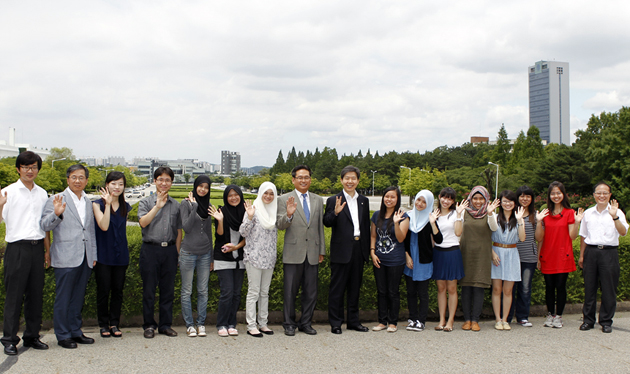10 Students Majoring in Korean Studies at the University of Malaya, one of the prestigious universities of Malaysia, Visit the YU 'Park Chung Hee School'
New 'Hallyu' expected in the Political and Economic Sector
[July 20, 2012]
 Students from the University of Malaya visiting the YU Park Chung Hee School of Policy and Saemaul pose in front of the camera together with the president Lee, Hyo-soo.
Students from the University of Malaya visiting the YU Park Chung Hee School of Policy and Saemaul pose in front of the camera together with the president Lee, Hyo-soo. “Seeing and hearing it here makes it more amazing. We were able to see for ourselves the development of Korea that we learned about through the news and books such as the 'Miracle on the Han River', 'Saemaul Movement' and the 'Saemaul Spirit'. We were also able to get a gist of how Korea was able to grow so much through this opportunity. After graduating from university, I would like to enroll in the 'Park Chung Hee School' and learn more."
This is what Devi A. Poetri (18, female), a freshman majoring in Korean Studies at the University of Malaysa in Malaysia, said after taking a look around at the Park Chung Hee School of Policy and Saemaul.
On the morning of the 20th, 10 female students from Malaysia visited YU. The purpose of the visit of these students who major in Korean Studies at the University of Malaya, which is one of the oldest and most prestigious universities in Malaysia, was to explore the 'Park Chung Hee School of Policy and Saemaul', which was opened in March of this year.
Led by Park, Chang-gyu, professor of Korean Studies at the University of Malaya, these students took their tour with an air of sincerity while visiting the classrooms, library, dorms, various places on campus, as well as the curriculum, enrollment and scholarship programs, educational environment, and information prepared by staff members of the Park Chung Hee School.
They asked many questions during a luncheon with YU president, Lee, Hyo-soo. The most frequently asked question was the secret behind Korea's high speed development. The president Lee said that the most important thing was for the philosophy and leadership of the person in charge of the policies and a national consensus and participation. When asked about the purpose of founding the Park Chung Hee School, he said with emphasis, "The purpose and mission of establishing this school is to localize the successful economic development model of Korea, which is best known through the Saemaul Movement, while also providing SDA (Self Development Assistance) rather than ODA (Official Development Assistance)." He also added, "The YU Park Chung Hee School will also assertively engage in realizing the dreams of youths in third world countries to become future leaders that lead development for their nation, while constructing a global human network."
Meanwhile, the 'Yeungnam University Park Chung Hee School of Policy and Saemaul' was opened in March of this year to become a global graduate school of policies like that of the 'Kennedy School' of Harvard University in the US and the 'Lee Kuan Yew School' of the National University of Singapore. It offers three majors such as Saemaul Studies, Public Policy Leadership, and Forest Resource and Ecological Restoration. 38 students including 34 foreigners from 15 countries (9 from Asia, 4 from Africa, and 2 from South America) are currently working on their master's degree here.
The backgrounds of the international students are quite astonishing. Most of them are elites serving in public offices or serving as professors in their nations. They receive full scholarships, one million won monthly living expenses, and a dormitory. Agreements were signed with the governments of Gyeongbuk and Daegu, and the Korea Forest Service to come up with the funds for the scholarship, while looking for ways to cooperate with institutes such as KOICA. Though it is operated as a special graduate school, it offers full-time classes and has three terms in a year. Therefore, it is possible to graduate in a year and a half. The faculty is composed of the best experts and scholars in the field such as Lee, Jai-chang, president of the Korea Saemaul Undong Center, Song, Byeong-rak, honorary professor of Seoul National University, and Lee, Don-koo, Minister of Korea Forest Service.










